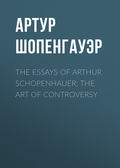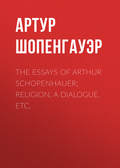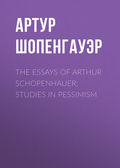
Артур Шопенгауэр
The World as Will and Idea (Vol. 3 of 3)
Chapter L. Epiphilosophy
At the conclusion of my exposition a few reflections concerning my philosophy itself may find their place. My philosophy does not pretend to explain the existence of the world in its ultimate grounds: it rather sticks to the facts of external and internal experience as they are accessible to every one, and shows the true and deepest connection of them without really going beyond them to any extra-mundane things and their relations to the world. It therefore arrives at no conclusions as to what lies beyond all possible experience, but affords merely an exposition of what is given in the external world and in self-consciousness, thus contents itself with comprehending the nature of the world in its inner connection with itself. It is consequently immanent, in the Kantian sense of the word. But just on this account it leaves many questions untouched; for example, why what is proved as a fact is as it is and not otherwise, &c. All such questions, however, or rather the answers to them, are really transcendent, i. e., they cannot be thought by the forms and functions of our intellect, do not enter into these; it is therefore related to them as our sensibility is related to the possible properties of bodies for which we have no senses. After all my explanations one may still ask, for example, whence has sprung this will that is free to assert itself, the manifestation of which is the world, or to deny itself, the manifestation of which we do not know. What is the fatality lying beyond all experience which has placed it in the very doubtful dilemma of either appearing as a world in which suffering and death reign, or else denying its very being? – or again, what can have prevailed upon it to forsake the infinitely preferable peace of blessed nothingness? An individual will, one may add, can only turn to its own destruction through error in the choice, thus through the fault of knowledge; but the will in itself, before all manifestation, consequently still without knowledge, how could it go astray and fall into the ruin of its present condition? Whence in general is the great discord that permeates this world? It may, further, be asked how deep into the true being of the world the roots of individuality go; to which it may certainly be answered: they go as deep as the assertion of the will to live; where the denial of the will appears they cease, for they have arisen with the assertion. But one might indeed even put the question, “What would I be if I were not will to live?” and more of the same kind. To all such questions we would first have to reply that the expression of the most universal and general form of our intellect is the principle of sufficient reason; but that just on this account that principle finds application only to the phenomenon, not to the being in itself of things. Yet all whence and why depend upon that principle alone. As a result of the Kantian philosophy it is no longer an æterna veritas, but merely the form, i. e., the function, of our intellect, which is essentially cerebral, and originally a mere tool in the service of the will, which it therefore presupposes together with all its objectifications. But our whole knowing and conceiving is bound to its forms; accordingly we must conceive everything in time, consequently as a before and after, then as cause and effect, and also as above and below, whole and part, &c., and cannot by any means escape from this sphere in which all possibility of our knowledge lies. Now these forms are utterly unsuited to the problems raised here, nor are they fit or able to comprehend their solution even if it were given. Therefore with our intellect, this mere tool of the will, we are everywhere striking upon insoluble problems, as against the walls of our prison. But, besides this, it may at least be assumed as probable that not only for us is knowledge of all that has been asked about impossible, but no such knowledge is possible in general, thus never and in no way; that these relations are not only relatively but absolutely insusceptible of investigation; that not only does no one know them, but that they are in themselves unknowable, because they do not enter into the form of knowledge in general. (This corresponds to what Scotus Erigena says, de mirabili divina ignorantia, qua Deus non intelligit quid ipse sit. Lib. ii.) For knowableness in general, with its most essential, and therefore constantly necessary form of subject and object, belongs merely to the phenomenal appearance, not to the being in itself of things. Where knowledge, and consequently idea, is, there is also only phenomenon, and we stand there already in the province of the phenomenal; nay, knowledge in general is known to us only as a phenomenon of brain, and we are not only unjustified in conceiving it otherwise, but also incapable of doing so. What the world is as world may be understood: it is phenomenal manifestation; and we can know that which manifests itself in it, directly from ourselves, by means of a thorough analysis of self-consciousness. Then, however, by means of this key to the nature of the world, the whole phenomenal manifestation can be deciphered, as I believe I have succeeded in doing. But if we leave the world in order to answer the questions indicated above, we have also left the whole sphere in which, not only connection according to reason and consequent, but even knowledge itself is possible; then all is instabilis tellus, innabilis unda. The nature of things before or beyond the world, and consequently beyond the will, is open to no investigation; because knowledge in general is itself only a phenomenon, and therefore exists only in the world as the world exists only in it. The inner being in itself of things is nothing that knows, no intellect, but an unconscious; knowledge is only added as an accident, a means of assistance to the phenomenon of that inner being, and can therefore apprehend that being itself only in proportion to its own nature, which is designed with reference to quite different ends (those of the individual will), consequently very imperfectly. Here lies the reason why a perfect understanding of the existence, nature, and origin of the world, extending to its ultimate ground and satisfying all demands, is impossible. So much as to the limits of my philosophy, and indeed of all philosophy.
The ἑν και παν, i. e., that the inner nature in all things is absolutely one and the same, my age had already grasped and understood, after the Eleatics, Scotus Erigena, Giordano Bruno, and Spinoza had thoroughly taught, and Schelling had revived this doctrine. But what this one is, and how it is able to exhibit itself as the many, is a problem the solution of which is first found in my philosophy. Certainly from the most ancient times man had been called the microcosm. I have reversed the proposition, and shown the world as the macranthropos: because will and idea exhaust its nature as they do that of man. But it is clearly more correct to learn to understand the world from man than man from the world; for one has to explain what is indirectly given, thus external perception from what is directly given, thus self-consciousness – not conversely.
With the Pantheists, then, I have certainly that ἑν και παν in common, but not the παν θεος; because I do not go beyond experience (taken in its widest sense), and still less do I put myself in contradiction with the data which lie before me. Scotus Erigena, quite consistently with the spirit of Pantheism, explains every phenomenon as a theophany; but then this conception must also be applied to the most terrible and abominable phenomena. Fine theophanies! What further distinguishes me from Pantheism is principally the following. (1). That their θεος is an x, an unknown quantity; the will, on the other hand, is of all possible things the one that is known to us most exactly, the only thing given immediately, and therefore exclusively fitted for the explanation of the rest. For what is unknown must always be explained by what is better known; not conversely. (2). That their θεος manifests himself animi causa, to unfold his glory, or, indeed, to let himself be admired. Apart from the vanity here attributed to him, they are placed in the position of being obliged to sophisticate away the colossal evil of the world; but the world remains in glaring and terrible contradiction with that imagined excellence. With me, on the contrary, the will arrives through its objectification however this may occur, at self-knowledge, whereby its abolition, conversion, salvation becomes possible. And accordingly, with me alone ethics has a sure foundation and is completely worked out in agreement with the sublime and profound religions, Brahmanism, Buddhism, and Christianity, not merely with Judaism and Mohammedanism. The metaphysic of the beautiful also is first fully cleared up as a result of my fundamental truth, and no longer requires to take refuge behind empty words. With me alone is the evil of the world honestly confessed in its whole magnitude: this is rendered possible by the fact that the answer to the question as to its origin coincides with the answer to the question as to the origin of the world. On the other hand, in all other systems, since they are all optimistic, the question as to the origin of evil is the incurable disease, ever breaking out anew, with which they are affected, and in consequence of which they struggle along with palliatives and quack remedies. (3.) That I start from experience and the natural self-consciousness given to every one, and lead to the will as that which alone is metaphysical; thus I adopt the ascending, analytical method. The Pantheists, again, adopt the opposite method, the descending or synthetical. They start from their θεος, which they beg or take by force, although sometimes under the name substantia, or absolute, and this unknown is then supposed to explain everything that is better known. (4.) That with me the world does not fill the whole possibility of all being, but in this there still remains much room for that which we denote only negatively as the denial of the will to live. Pantheism, on the other hand, is essentially optimism: but if the world is what is best, then the matter may rest there. (5.) That to the Pantheists the perceptible world, thus the world of idea, is just the intentional manifestation of the God indwelling in it, which contains no real explanation of its appearance, but rather requires to be explained itself. With me, on the other hand, the world as idea appears merely per accidens, because the intellect, with its external perception, is primarily only the medium of motives for the more perfect phenomena of will, which gradually rises to that objectivity of perceptibility, in which the world exists. In this sense its origin, as an object of perception, is really accounted for, and not, as with the Pantheists, by means of untenable fictions.
Since, in consequence of the Kantian criticism of all speculative theology, the philosophisers of Germany almost all threw themselves back upon Spinoza, so that the whole series of futile attempts known by the name of the post-Kantian philosophy are simply Spinozism tastelessly dressed up, veiled in all kinds of unintelligible language, and otherwise distorted, I wish, now that I have explained the relation of my philosophy to Pantheism in general, to point out its relation to Spinozism in particular. It stands, then, to Spinozism as the New Testament stands to the Old. What the Old Testament has in common with the New is the same God-Creator. Analogous to this, the world exists, with me as with Spinoza, by its inner power and through itself. But with Spinoza his substantia æterna, the inner nature of the world, which he himself calls God, is also, as regards its moral character and worth, Jehovah, the God-Creator, who applauds His own creation, and finds that all is very good, παντα καλα λιαν. Spinoza has deprived Him of nothing but personality. Thus, according to him also, the world and all in it is wholly excellent and as it ought to be: therefore man has nothing more to do than vivere, agere, suum Esse conservare ex fundamento proprium utile quærendi (Eth., iv. pr. 67); he is even to rejoice in his life as long as it lasts; entirely in accordance with Ecclesiastes ix. 7-10. In short, it is optimism: therefore its ethical side is weak, as in the Old Testament; nay, it is even false, and in part revolting.54 With me, on the other hand, the will, or the inner nature of the world, is by no means Jehovah, it is rather, as it were, the crucified Saviour, or the crucified thief, according as it resolves. Therefore my ethical teaching agrees with that of Christianity, completely and in its highest tendencies, and not less with that of Brahmanism and Buddhism. Spinoza could not get rid of the Jews; quo semel est imbuta recens servabit odorem. His contempt for the brutes, which, as mere things for our use, he also declares to be without rights, is thoroughly Jewish, and, in union with Pantheism, is at the same time absurd and detestable (Eth., iv., appendix, c. 27). With all this Spinoza remains a very great man. But in order to estimate his work correctly we must keep in view his relation to Descartes. The latter had sharply divided nature into mind and matter, i. e., thinking and extended substance, and had also placed God and the world in complete opposition to each other; Spinoza also, so long as he was a Cartesian, taught all that in his “Cogitatis Metaphysicis,” c. 12, i. I., 1665. Only in his later years did he see the fundamental falseness of that double dualism; and accordingly his own philosophy principally consists of the indirect abolition of these two antitheses. Yet partly to avoid injuring his teacher, partly in order to be less offensive, he gave it a positive appearance by means of a strictly dogmatic form, although its content is chiefly negative. His identification of the world with God has also this negative significance alone. For to call the world God is not to explain it: it remains a riddle under the one name as under the other. But these two negative truths had value for their age, as for every age in which there still are conscious or unconscious Cartesians. He makes the mistake, common to all philosophers before Locke, of starting from conceptions, without having previously investigated their origin, such, for example, as substance, cause, &c., and in such a method of procedure these conceptions then receive a much too extensive validity. Those who in the most recent times refused to acknowledge the Neo-Spinozism which had appeared, for example, Jacobi, were principally deterred from doing so by the bugbear of fatalism. By this is to be understood every doctrine which refers the existence of the world, together with the critical position of mankind in it, to any absolute necessity, i. e., to a necessity that cannot be further explained. Those who feared fatalism, again, believed that all that was of importance was to deduce the world from the free act of will of a being existing outside it; as if it were antecedently certain which of the two was more correct, or even better merely in relation to us. What is, however, especially assumed here is the non datur tertium, and accordingly hitherto every philosophy has represented one or the other. I am the first to depart from this; for I have actually established the Tertium: the act of will from which the world arises is our own. It is free; for the principle of sufficient reason, from which alone all necessity derives its significance, is merely the form of its phenomenon. Just on this account this phenomenon, if it once exists, is absolutely necessary in its course; in consequence of this alone we can recognise in it the nature of the act of will, and accordingly eventualiter will otherwise.
Appendix
Abstract
Schopenhauer's Essay on the Fourfold Root of the Principle of Sufficient Reason (Fourth Edition, Edited by Frauenstädt. The First Edition appeared in 1813).
This essay is divided into eight chapters. The first is introductory. The second contains an historical review of previous philosophical doctrines on the subject. The third deals with the insufficiency of the previous treatment of the principle, and prescribes the lines of the new departure. The fourth, fifth, sixth, and seventh treat of the four classes of objects for the subject, and the forms of the principle of sufficient reason which respectively characterise these classes. The eighth contains general remarks and results. It will be convenient to summarise these chapters severally.
Chapter I
Schopenhauer points out that Plato and Kant agree in recommending, as the method of all knowledge, obedience to two laws: – that of Homogeneity, and that of Specification. The former bids us, by attention to the points of resemblance and agreement in things, get at their kinds, and combine them into species, and these species again into genera, until we have arrived at the highest concept of all, that which embraces everything. This law being transcendental, or an essential in our faculty of reason, assumes that nature is in harmony with it, an assumption which is expressed in the old rule: Entia præter necessitatem non esse multiplicanda. The law of Specification, on the other hand, is stated by Kant in these words: Entium varietates non temere esse minuendas. That is to say, we must carefully distinguish the species which are united under a genus, and the lower kinds which in their turn are united under these species; taking care not to make a leap, and subsume the lower kinds and individuals under the concept of the genus, since this is always capable of division, but never descends to the object of pure perception. Plato and Kant agree that these laws are transcendental, and that they presuppose that things are in harmony with them.
The previous treatment of the principle of sufficient reason, even by Kant, has been a failure, owing to the neglect of the second of these laws. It may well be that we shall find that this principle is the common expression of more than one fundamental principle of knowledge, and that the necessity, to which it refers, is therefore of different kinds. It may be stated in these words: Nihil est sine ratione cur potius sit, quam non sit. This is the general expression for the different forms of the assumption which everywhere justifies that question “Why?” which is the mother of all science.
Chapter II
Schopenhauer in this chapter traces historically the forms in which the principle had been stated by his predecessors, and their influence. He points out that in Greek philosophy it appeared in two aspects – that of the necessity of a ground for a logical judgment, and that of a cause for every physical change – and that these two aspects were systematically confounded. The Aristotelian division, not of the forms of the principle itself, but of one of its aspects, the causal, exemplified a confusion which continued throughout the Scholastic period. Descartes succeeds no better. His proof of the existence of God that the immensity of His nature is a cause or reason beyond which no cause is needed for His existence, simply illustrates the gross confusion between cause and ground of knowledge which underlies every form of this ontological proof. “That a miserable fellow like Hegel, whose entire philosophy is nothing but a monstrous amplification of the ontological proof, should dare to defend this proof against Kant's criticism of it is an alliance of which the ontological proof itself, little as it knows of shame, might well feel ashamed. It is not to be expected I should speak respectfully of people who have brought philosophy into disrespect.” Spinoza made the same confusion when he laid it down that the cause of existence was either contained in the nature and definition of the thing as it existed, or was to be found outside that thing. It was through this confusion of the ground of knowledge with the efficient cause that he succeeded in identifying God with the world. The true picture of Spinoza's “Causa sui” is Baron Munchhausen encircling his horse with his legs, and raising himself and the horse upwards by means of his pigtail, with the inscription “Causa sui” written below. Leibnitz was the first to place the principle of sufficient reason in the position of a first principle, and to indicate the difference between its two meanings. But it was Wolff who first completely distinguished them, and divided the doctrine into three kinds: principium fiendi (cause), principium essendi (possibility), and principium cognoscendi. Baumgarten, Reimarus, Lambert, and Platner added nothing to the work of Wolff, and the next great step was Hume's question as to the validity of the principle. Kant's distinction of the logical or formal principle of knowledge – Every proposition must have its ground; from the transcendental or material principle, Every thing must have its ground – was followed out by his immediate successors. But when we come to Schelling we find the proposition that gravitation is the reason and light the cause of things, a proposition which is quoted simply as a curiosity, for such a piece of nonsense deserves no place among the opinions of earnest and honest inquirers. The chapter concludes by pointing out the futility of the attempts to prove the principle. Every proof is the exhibition of the ground of a judgment which has been expressed, and of which, just because that ground is exhibited, we predicate truth. The principle of sufficient reason is just this expression of the demand for such a ground, and he who seeks a proof, i. e., the exhibition of a ground for this principle itself, presupposes it as true, and so falls into the circle of seeking a proof of the justification of the demand for proof.







